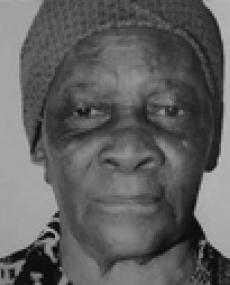
Mary Thipe was born in 1917* in Ramhlakoane, a village in the Matatiele district, Natal (now KwaZulu-Natal) near the Eastern Cape border. Later, as a young woman, she moved to Umkhumbane, Durban, Natal and in 1952 joined the liberation struggle. She joined the African National Congress (ANC) and became the ANC Women’s League (ANCWL) vice-chairperson in the Cato Manor region. She not only fought against the apartheid government’s strategies to keep Black families on the back foot, but she also fought against the discriminatory laws and cruelty that those arrested by the oppressive government were subjected to.
As an ANC member, she was in charge of recruiting young people into the organisation to ensure that Umkhonto weSizwe (MK), the ANC’s military wing, had a steady supply of fighters.
She was part of the iconic women’s march of 1956 which saw 20,000 women march to the Union Buildings in Pretoria in opposition to the pass laws. In 1960, she was among those who took part in the Cato Manor Beer Hall March; she and a number of women marched to the beer hall in Cato Manor and attacked their husbands with sticks and destroyed the beer hall. This was because the government used the beer hall as a strategy to keep the men away from the struggle by enticing them with alcohol, therefore keeping them drunk and away from their wives and children at home. She was also involved in what became known as the Potato Boycott of 1959, a boycott that was in response to the inhumane treatment of Black workers on potato farms in Bethal, Eastern Transvaal (now Mpumalanga). The successful campaign called for a nation-wide boycott on potatoes.
Thipe’s political activities in the struggle earned her the attention of the apartheid government. As a consequence, she was arrested, detained, and banned for five years, which was followed by another five years of house arrest, during which she was not allowed to attend funeral services of her loved ones, go to church or be in the company of a group of more than three people. She also had to report at the Cato Mano police station every Monday morning. Even so, the security branch continued to harass her but this did not deter her from her work with the ANCWL as she assisted by organising the funerals of deceased comrades.
Thipe was a brave woman who refused to show any fear towards the security police. For example, when one of her grandsons left the country and went into exile, the police retaliated by threatening her that they would find her grandson and kill him, to which she responded by saying that they should bring her his head. This fearlessness is something that she instilled in her six children as well, training them that whenever the police would come to their house in the middle of the night, they should wake up, stand behind her and look at them straight in the eye without flinching. In 1986, the police, using a gang known as the A-team, burnt her house down.
For her contribution towards fighting for social justice and advancing democracy in the country, Thipe was (posthumously) awarded one of the highest awards that the country bestows to its citizens and prominent foreign nationals – the Order of Luthuli by former President Jacob Zuma in 2016. This award is specifically given to South Africans who have contributed to the liberation struggle, nation-building and the fight for peace and human rights. She was also recognised for the work she did in the Durban townships of Chesterville and Ntuzuma when a road was named after her in Durban.
Thipe died in 2000 following a stroke. In 2001 an education fund which helps poor children continue with their studies was named after her.
*Some sources claim that Thipe was born in 1918.